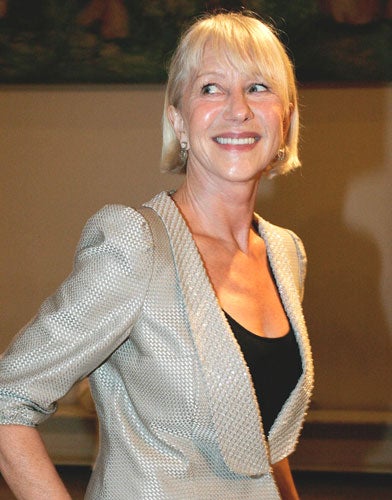Mirren brings stage to silver screen
Oscar-winner to star in Racine's 'Phaedra' as National Theatre broadcasts live theatre to 150 cinemas worldwide

Your support helps us to tell the story
From reproductive rights to climate change to Big Tech, The Independent is on the ground when the story is developing. Whether it's investigating the financials of Elon Musk's pro-Trump PAC or producing our latest documentary, 'The A Word', which shines a light on the American women fighting for reproductive rights, we know how important it is to parse out the facts from the messaging.
At such a critical moment in US history, we need reporters on the ground. Your donation allows us to keep sending journalists to speak to both sides of the story.
The Independent is trusted by Americans across the entire political spectrum. And unlike many other quality news outlets, we choose not to lock Americans out of our reporting and analysis with paywalls. We believe quality journalism should be available to everyone, paid for by those who can afford it.
Your support makes all the difference.When Helen Mirren announced that she had finally found a window in her film schedule to tread the boards after a six-year absence from the stage, her fans couldn't wait to book their tickets to see Phaedra at the National Theatre this summer.
But yesterday it emerged that even her grand return to theatre will be filmed for cinema. The cameras just can't seem to stay away from Mirren.
Nicholas Hytner, director of the National Theatre, revealed that Mirren had become the first theatre actor to give her approval to having one night of her performance at the National filmed and broadcast live in 150 cinemas across the globe.
In an unprecedented move, Hytner has decided to allow cameras into four productions this year to stream theatrical performances live to 50 cinema auditoriums in the UK, as well as about 100 further afield, where plays could be broadcast up to 24 hours after they had been performed.
The theatre is currently in consultation with independent cinemas. Hytner said filming would include close-ups of actors, and would most likely take place a week or two after opening night. Audiences would be offered cheaper tickets due to the presence of the cameras. What he also envisaged was additional footage for cinema viewers, including backstage and interviews during intervals.
Hytner called the move, which emulates the Royal Opera House in London and the Metropolitan Opera in New York, an "experiment" that would initially cost the theatre £200,000.
But if proven successful, it would allow cinema audiences around the world to tune into live theatre for a cut-price £10 ticket and become blueprint for other theatres in the West End.
Mirren, said Hytner, would be fronting a major PR campaign, called NT Live, from the end of April, to highlight the plan. The hope is that audience figures would increase because of Mirren's performance in the live cinema version. He said three other plays would be shown in the same way, but declined to name them yet.
"It felt to us that someone in theatre had to try this and that it had to be us. We will spend money on this relatively expensive operation and we will see if there's a call for it," he said.
Hytner added that had there been live streaming when he was growing up in Manchester, he would have benefited from them. "If (Laurence) Olivier's productions had been available in Manchester when I was a teenager, I would have gone every time," he said.
Last September, the theatre revealed they had secured Mirren for the lead role in Racine's tragedy, which is translated by the poet, Ted Hughes. It will be directed by Hytner and ticket bookings open on 13 March. It will be Mirren's first stage appearance since winning an Oscar for her performance in the film, The Queen. She last trod the boards in 2003.
Hytner also announced a new play by Alan Bennett, about the poet, WH Auden, which would feature a fictional meeting between Auden and Benjamin Britten that led to the end of their friendship in the 1940s.
Join our commenting forum
Join thought-provoking conversations, follow other Independent readers and see their replies
Comments